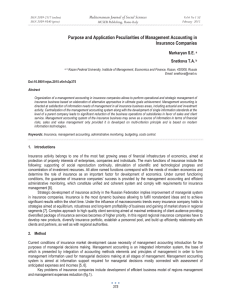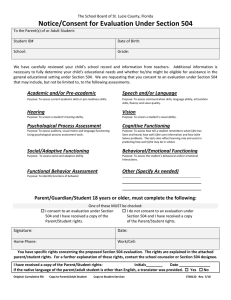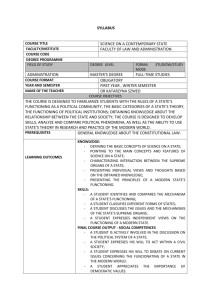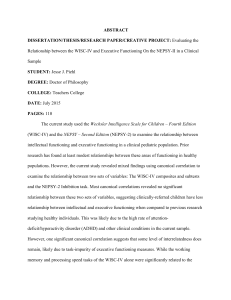Economic Interests as the Basis for Coordinated Management of Organizational... Mediterranean Journal of Social Sciences Elena A.Kandrashina
advertisement
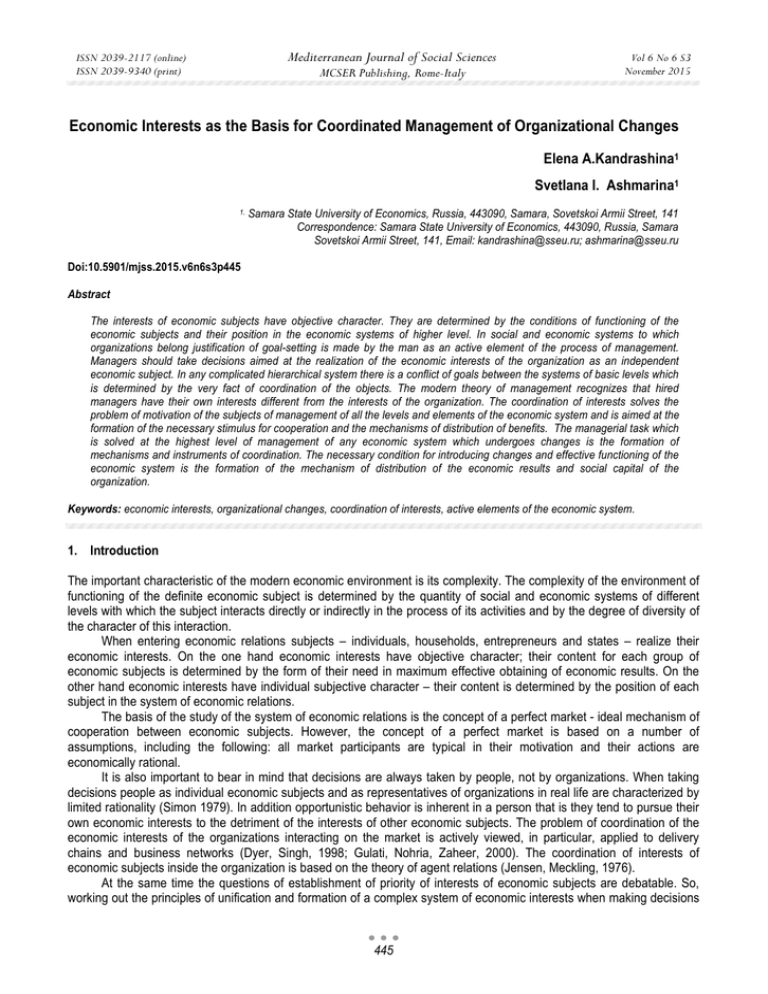
Mediterranean Journal of Social Sciences ISSN 2039-2117 (online) ISSN 2039-9340 (print) MCSER Publishing, Rome-Italy Vol 6 No 6 S3 November 2015 Economic Interests as the Basis for Coordinated Management of Organizational Changes Elena A.Kandrashina1 Svetlana I. Ashmarina1 1. Samara State University of Economics, Russia, 443090, Samara, Sovetskoi Armii Street, 141 Correspondence: Samara State University of Economics, 443090, Russia, Samara Sovetskoi Armii Street, 141, Email: kandrashina@sseu.ru; ashmarina@sseu.ru Doi:10.5901/mjss.2015.v6n6s3p445 Abstract The interests of economic subjects have objective character. They are determined by the conditions of functioning of the economic subjects and their position in the economic systems of higher level. In social and economic systems to which organizations belong justification of goal-setting is made by the man as an active element of the process of management. Managers should take decisions aimed at the realization of the economic interests of the organization as an independent economic subject. In any complicated hierarchical system there is a conflict of goals between the systems of basic levels which is determined by the very fact of coordination of the objects. The modern theory of management recognizes that hired managers have their own interests different from the interests of the organization. The coordination of interests solves the problem of motivation of the subjects of management of all the levels and elements of the economic system and is aimed at the formation of the necessary stimulus for cooperation and the mechanisms of distribution of benefits. The managerial task which is solved at the highest level of management of any economic system which undergoes changes is the formation of mechanisms and instruments of coordination. The necessary condition for introducing changes and effective functioning of the economic system is the formation of the mechanism of distribution of the economic results and social capital of the organization. Keywords: economic interests, organizational changes, coordination of interests, active elements of the economic system. 1. Introduction The important characteristic of the modern economic environment is its complexity. The complexity of the environment of functioning of the definite economic subject is determined by the quantity of social and economic systems of different levels with which the subject interacts directly or indirectly in the process of its activities and by the degree of diversity of the character of this interaction. When entering economic relations subjects – individuals, households, entrepreneurs and states – realize their economic interests. On the one hand economic interests have objective character; their content for each group of economic subjects is determined by the form of their need in maximum effective obtaining of economic results. On the other hand economic interests have individual subjective character – their content is determined by the position of each subject in the system of economic relations. The basis of the study of the system of economic relations is the concept of a perfect market - ideal mechanism of cooperation between economic subjects. However, the concept of a perfect market is based on a number of assumptions, including the following: all market participants are typical in their motivation and their actions are economically rational. It is also important to bear in mind that decisions are always taken by people, not by organizations. When taking decisions people as individual economic subjects and as representatives of organizations in real life are characterized by limited rationality (Simon 1979). In addition opportunistic behavior is inherent in a person that is they tend to pursue their own economic interests to the detriment of the interests of other economic subjects. The problem of coordination of the economic interests of the organizations interacting on the market is actively viewed, in particular, applied to delivery chains and business networks (Dyer, Singh, 1998; Gulati, Nohria, Zaheer, 2000). The coordination of interests of economic subjects inside the organization is based on the theory of agent relations (Jensen, Meckling, 1976). At the same time the questions of establishment of priority of interests of economic subjects are debatable. So, working out the principles of unification and formation of a complex system of economic interests when making decisions 445 ISSN 2039-2117 (online) ISSN 2039-9340 (print) Mediterranean Journal of Social Sciences MCSER Publishing, Rome-Italy Vol 6 No 6 S3 November 2015 aimed at changing the activities of a definite economic subjects and influencing the existing system of its economic relations is an important task of the economic science development. 2. The Main Results of the Study To our point of view consideration of the problem of coordinated management must be based on the system approach as system is first of all organized set of elements between which are the links determining the behavior of the entire system. Management of the complicated economic system must be built on the accentuation of the target function of its development in accordance with the criteria of efficiency which, in its turn, is determined by the economic interests of the system of this or that level functioning as the independent economic subject. The interests of economic subjects have objective character: they are formed by the necessity to satisfy the existing and developing needs of these subjects. Objectivity of interests means that they are determined by the conditions of functioning of the economic subjects, their position in the economic systems of the higher level. Organization as an independent economic subject is a complicated open dynamically developing system being at the same time subsystem of more complicated systems of macro- and mezo-levels. In the socio-economic systems, which include organizations justification of the function of goal-setting is done by the man - an active element of the management process. Managers must take decisions aimed at the implementing of the economic interests of the organization as an independent economic subject which they represent. Considering the logic of decision-making it is necessary to consider two points. Firstly, in any complicated hierarchically organized system to which economy belongs there will be the conflict of goals between the systems of basic levels which is stipulated by the very fact of consistency of its components. With the development of business there is a significant complication of its organizational structure; the system of responsibility centers that have varying degrees of isolation and self-sufficiency and have conflicting interests is formed. Nowadays management theory and practice solved the problem of the allocation of resources and orders between the units of the organization, as well as between the members of delivery chains. But the existing mechanisms of management of inner organizational links and the links between organizations do not provide complex coordination of the economic interests of the elements of the economic system and the interrelation of such systems. Secondly, the modern theory of management recognizes that hired managers have their own interests different from the interests of the organization. The existence of the potential conflict of interest leads to the fact that the criterion of distribution of management authority is often a high level of confidence, not the effectiveness of managers. In conditions of multiple centers of decision-making within the frame of the organization there is formed misbalanced system of multidirectional economic interests characterized by the contradictions between the interests of the organization and the interests of its external counter-agents as well as the contradictions between the interests of the organization in general and the interests of its managers who are responsible of the spheres of decision-making of different levels. So, making organizational changes connected with the development and optimization of the economic system structure demands solving of the problem of interests coordination: on the one hand, managerial decisions made on this or that level of management should provide the realization of the system economic interests. On the other hand, these decisions are taken under the influence of the specific interests of the members of the management process. Only complex approach providing coordinated interaction of all the elements and levels of management as well as coordinated interaction of the economic system with its counter-agents will make it possible to make the process of changes implementation effective. The managerial task solved at the highest level of management of any economic system undergoing changes is the formation of mechanisms and tools of coordination. We view the mechanism of management as the system of managerial influence on the economic relations between the subjects of management carrying out purposeful activities aimed at the management of the organization on the basis of different methods. Such system of managerial influence should provide the coordination of interests of the members of business and/or functional subdivisions within the organization. The concepts “coordination of interests” (“alignment of interests”) ɢ "coordination of actions" (“alignment of actions”) were introduced in 2005 [Gulati, Lawrence, Puranam, 2005, p. 419]. Coordination of interests solves the task of motivation of the subjects of management of all levels and the elements of the economic system and is aimed at the formation of the necessary stimulus for cooperation and the mechanisms of distribution of the corresponding benefits. The mechanism of distribution of benefits will be approved by the interested sides if the final financial result of the activities of each side will correspond to their idea of the allocation of risk and their demands of profitability formed in the process of coordination. The necessity to coordinate the activities of the management subjects of all the levels and the elements of the 446 ISSN 2039-2117 (online) ISSN 2039-9340 (print) Mediterranean Journal of Social Sciences Vol 6 No 6 S3 November 2015 MCSER Publishing, Rome-Italy economic system is stipulated by the fact that the efficiency of its functioning is determined not only by factually established but also potentially existing links between the sub-systems. Because of such phenomena as information asymmetry, insufficient transparency of the rules of decision-making characteristic for complicated systems, the economic system can not realize its inherent property of emergence to full extent without coordination of actions. A number of studies of both Russian (Burkov 2002, Voronin 2003) and foreign (Granovetter 1985, Mentzer 2000) scientists point out the necessity of coordination of interests and actions taking into consideration personal aspect. People with their individual characteristics and goal-setting act as the active elements of the management system. Their actions provide the achievement of the goals of the economic system taking into account personal characteristics which serve as constraints. The task of organizational changes management is to establish the clearly regulated balance of authorities and responsibilities of the active elements of the structure. When implementing organizational changes it is necessary to take into account the group of subjective factors chosen in accordance with specificity of personal characteristics revealing in the process of management. These factors include psychological factors, the level of intellectual potential, values and personal relationships of the members of the management team. Correspondingly the state of the active element and the compatibility of its objectives with the objectives of the economic system as well as the personal social links significantly influence the relations inside the organization, the conditions and the results of the economic activities of the subjects of these relations. Let us define the objective function of the economic system as C. The personal factor brings certain instability and lack of clearance in the achieving of the goal because of the personal characteristics of the active elements, including individual value orientations. As a result the system of goals ɋ* which is used by the active elements of the management * structure in their activities is formed. This system of goals does not fully coincide with ɋ, so ɋ ⊆ ɋ . When formalizing the relationship between the active elements of the organizational structure there can be prepared the following extreme variants of functioning: - the formation of a system of rigid management relations providing the organization of structures with temporary functions, powers, communication, management resources for effective solving of the tasks set at a higher level of management. This option which can be defined as the "manual control" restricts the freedom of actions of the active elements; the key factor defining the system quality of management system are the competence of senior management; - independent operation of the active elements taking into account their own interests which leads to the emergence of a new and effective structure. The implementation of this option requires the simultaneous fulfillment of the following conditions: on the one hand, social capital is needed, on the other hand, the adaptation of the structure requires considerable time. Thus, in the context of issues considered prerequisites for organizational changes and the efficient functioning of the economic system are the formation of the mechanism of distribution of economic results and social capital of the organization. The mechanism of distribution of the economic results within the frame of coordinated management provides formation and distribution of synergetic effect exceeding the costs and losses of all economic systems involved in the interaction. The positive economic effect of the coordinated functioning of economic systems is formed as the result of the system of coordinated management influences of the interacting active elements aimed at the realization of their economic interests. All the subjects of business functioning on the branch and financial markets have the same economic interests – getting business profit, the level of which corresponds to the level of business risk. Business profit is formed on the basis of added value created by the activities on the branch market and this profit for each member of economic relations depends to a great extent on its branch competitiveness and the character of the established business ties. On the one hand, each member of the branch chain of creating the cost for the end-user wants maximization of its own profit. As the result of the branch competition based on commission of single transactions the prices for the end-users decrease which is sometimes accompanied by the decrease of quality of the final product. The transition from single transactions to the formation of a long-term relationship between the parties resulting in the formation of business chains and networks, provides a framework for coordinated management of the process of creating value for the end user of the product, which leads to stable economic results acceptable by all participants of the value chain. Obtaining maximum business income requires the establishment of maximum added value. Integration of stakeholders in the value chain or business network leads to the need to harmonize their interests in order to ensure the maximization of the total value added. Thus, added value indicator can serve not only the individual, but also the agreed performance criteria of economic agents on the branch market - organization and its counterparties. 447 ISSN 2039-2117 (online) ISSN 2039-9340 (print) Mediterranean Journal of Social Sciences MCSER Publishing, Rome-Italy Vol 6 No 6 S3 November 2015 Economic interests of investors and creditors – counter-agents of the organization from financial market - are also in getting the profit. Their business profit is the financial costs of the economic subjects – recipients of financial resources for the investments on the branch markets for creating value. The level of profit acceptable for the investors and creditors is determined by the level of business risk and financial risk taken by this contact auditorium and depends on financial competitiveness of the organization financed by them. As the source of paying financial costs is the created added value, the resultant economic indicator of economic added value (EVA -Economic Value Added) can be viewed as the criterion of efficiency of the organization functioning which makes it possible to provide coordination of its economic interests with the interests of the counter-agents on the financial market. When starting to interact the active elements in accordance with the criterion of interests coordination R choose zk economic parameters of functioning of the structures managed by them. ɷɤɨɧɨɦɢɱɟɫɤɢɯ ɩɚɪɚɦɟɬɪɨɜ ɮɭɧɤɰɢɨɧɢɪɨɜɚɧɢɹ ɭɩɪɚɜɥɹɟɦɵɯ ɢɦɢ ɫɬɪɭɤɬɭɪ. The difference in the system of goals determines the difference between the parameters of functioning of economic subsystems from those required to achieve the objective function of the economic system. zk values may differ from the optimal parameters of the functioning of economic systems, considered in isolation, yk. In this context, providing of coherence of functioning of the organization and its counter-agents is possible only on the basis of a compromise in the processes of system interactions, providing a redistribution of economic effects. At the same time it is important to form the mechanism of feedback providing the correction of targets of the active elements contradicting to the targets set. As presupposition let us define that each active element is endowed with fully active properties, i.e. it has the freedom to shape the economic parameters of the economic system in accordance with the criteria of the target matching Rk. In the formation of the program of coordinated functioning the planned economic parameters for each of the economic systems take the value hk (Rk) = max Rk (yk). Within the framework of the established criteria of target coordination Rk but following their own target setting, the active element of the k economic system generates values of the economic parameters zk. In this case, the set of interrelated economic systems loses part of its maximum efficiency criterion which must be ensured by the contribution of k economic system: ¨hk (zk) = hk (Rk) - Rk (zk). It is evident that the misbalance in distribution of the economic effect of coordinated management of the active elements – the members of interaction influences negatively on the result: ¨hk (zk) > 0. The maximum alignment of the goals of active elements with the target settings of the economic systems is possible provided that the effect of coordinated control is sufficient to bring the results of functioning of the interacting economic systems to their target values. Social capital is determined by human capital of the economic system and the system of knowledge exchange and building of relationships formed in it. For the organization social capital is an important link providing the functioning of all the elements of the organizational structure on the basis of the definite system of values and standards of the f relationships between the levels and elements of the system of management of the organization as well as between the relationships of the organization and its counter-agents. An important direction of the social capital development is strengthening of trust between the managers and the internal (personnel) and external (owners and their representatives, creditors, business-partners) economic subjects. The formation of the social capital makes it possible to prevent the formation of the groups of interests which do not coincide with the interests of the organization in general. 3. Conclusion As a result of organizational changes, a new structure of the economic system, the corresponding system of management of internal and external economic relations. The activities require not only the modeling of their potential impacts but also the assessment of their efficiency - both prospective and retrospective. The relationship and possible interaction of the parameters of the active elements of the economic systems should be also taken into account. References Dyer J. H., Singh H. 1998. The Relational View: Cooperative Strategy and the Sources of Interorganizational Competitive Advantages. // Academy of Management Review ʋ 23 (4): p. 660–679. Granovetter M. Economic Action and Social Structure: The Problem of Embeddedness // American Journal of Sociology. - 1985. - ʋ 3. - 448 ISSN 2039-2117 (online) ISSN 2039-9340 (print) Mediterranean Journal of Social Sciences MCSER Publishing, Rome-Italy Vol 6 No 6 S3 November 2015 p. 481-510. Gulati R., Lawrence P.R., Puranam P. Adaptation in Vertical Relationships: Beyond Incentive Conflicts // Strategic Management Journal. - 2005. - ʋ 5. - p. 415-440. Gulati R., Nohria N., Zaheer A. 2000. Strategic Networks. Strategic Management Journal ʋ 21 (3). –p. 203–216. Jensen M., Meckling, W. Theory of the Firm: Managerial Behavior, Agency Costs and Ownership Structure // Journal of Financial Economics.1976. Vol. 3. ʋ 4. Mentzer J.T., Min S., Zacharia Z.G. The Nature of Interfirm Partnering in Supply Chain Management // Journal of Retailing. - 2000. - ʋ 4. - p. 549-568. Simon, H. (1979) Rational Decision Making in Business Organizations // American Economic Review. September 1979. Vol. 69. ʋ 4. P. 493-513. Burkov V.N., Dorohin V.V., Balashov V.G. The Mechanisms of Coordination of Corporative Interests - Ɇ.: Institute of Management Problems of the Russian Academy of Science, 2002. – p.73 Voronin A.A., Mishin S.P. Optimal Hierarchical Structures. - Ɇ.: Institute of Management Problems of the Russian Academy of Science, 2003. – p. 214. 449

